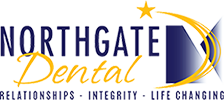Sleep apnea affects millions of Americans, often undiagnosed, leading to disrupted sleep, daytime fatigue, and long-term health risks. What many people don’t realize is that dental offices like Northgate Dental in Colorado Springs can play a key role in diagnosing, managing, and even alleviating obstructive sleep apnea (OSA). Below, we explore what sleep apnea is, how we help, what treatment options are available (especially dental appliances), and when referrals are needed.
What is Obstructive Sleep Apnea?
Obstructive Sleep Apnea (OSA) is a disorder in which the airway becomes partially or fully blocked during sleep, resulting in snoring, gasping—sometimes brief periods of stopped breathing. This can lead to poor sleep quality, fatigue, cardiovascular stress (such as high blood pressure), and other health complications. It’s far more than just loud snoring.
How a Dental Office Can Help
Dental professionals are sometimes the first people who notice signs of sleep-related breathing issues. Here’s how a dental office like Northgate Dental contributes:
- Screening & Dental Exam
During routine dental checkups, dentists can observe indicators of OSA risk: signs of bruxism (teeth grinding), wear on teeth, jaw alignment issues, large tonsils or soft tissue in the throat, daytime fatigue reported by patients. If we suspect sleep apnea, we can recommend further testing or consultation with a sleep specialist. - Custom Oral Appliances
One big tool in a dentist’s toolbox is the use of oral appliances. Northgate Dental has an entire Q&A page on this: Oral Appliances for Sleep Apnea: Questions and Answers which explains how these devices work.- These appliances are custom-molded, similar in some ways to night guards for grinding, but designed to pull the lower jaw forward slightly. This helps keep throat tissues from collapsing and blocking the airway while sleeping. (Northgate Dental)
- Oral appliances are quieter, more compact, and often more tolerable than CPAP machines for many people. They don’t involve masks or hoses, and they offer a more travel-friendly solution. (Northgate Dental)
- Bite Correction and Alignment
Sometimes issues with jaw alignment or bite contribute to airway obstruction. Dental interventions—correcting bite, adjusting the positions of teeth, or making modifications to dental structure—can reduce or even eliminate the need for devices in certain cases. Again, the oral appliance therapy process often includes evaluating bite alignment. - Monitoring & Follow-Up
Getting an oral appliance isn’t the end. Proper fit, comfort, adjustments, cleaning, and follow-ups are essential. Dental offices help monitor how well the appliance is working—if improvement in sleep quality or reduction in symptoms occurs—and make adjustments as needed. Northgate’s appliance therapy includes these follow-ups.
When Referrals Are Necessary
While dental offices can do quite a bit, some cases require collaboration with sleep specialists, ENT physicians, or medical doctors. Here are situations when a referral is appropriate:
- If diagnosis isn’t clear (a formal sleep study needed).
- If symptoms are severe: very frequent apneic episodes, very low oxygen saturation.
- If patient has comorbidities (cardiovascular disease, obesity, other medical conditions) that complicate treatment.
- If CPAP therapy has been tried but cannot be tolerated—even then, an oral appliance may serve as an alternative.
Northgate Dental works as part of a broader care team; if a referral is needed, we help you navigate that, ensuring coordinated care for the best outcomes.
Benefits & Limitations
Benefits:
- Improved sleep quality, reduced snoring, less daytime fatigue.
- Oral appliances are often more comfortable, easier to travel with, no mask or machine needed.
- Non-invasive, reversible treatments.
- Dental oversight ensures that appliances are custom fitted, oral health maintained (teeth, gums, appliance hygiene).
Limitations:
- Appliances won’t work for everyone. Some patients may still need CPAP or surgery.
- There may be side effects: mild jaw discomfort, increased salivation, potential changes in bite over time.
- Insurance coverage may vary; appliances may not be fully covered. Discuss with Northgate Dental about financial options.
What to Expect: The Process at Northgate Dental
Here’s what working with us typically looks like:
- Contact & Appointment Setup
Use our Appointment page to schedule an evaluation. Or if you have questions first, Contact Us anytime. - Consultation & Evaluation
We’ll review your sleep history, symptoms (snoring, waking, suspected apneas), examine oral structures, bite, jaw motion, and overall health. - Recommendation of Treatment Option
Depending on your needs, we may recommend an oral appliance, bite correction, or refer you for a sleep study or medical evaluation. - Fitting & Follow-up
If an oral appliance is chosen, impressions are taken, the device is custom made, fitted, adjusted, and you’ll return for follow-ups to check fit, comfort, effectiveness. - Long-Term Care
Over time, we monitor for improvements, ensure oral health, make any necessary adjustments or course corrections.
Why Choose Northgate Dental
At Northgate Dental, our commitment is to deliver comprehensive dental care that includes recognition and management of systemic health issues like sleep apnea. We combine the latest appliance options with personalized care in a caring environment. You don’t have to accept sleepless nights or poor quality sleep.
Ready to Get Started?
If you or a loved one suspects sleep apnea is affecting your health, we’d encourage you to take the first step. Schedule your consultation via our Appointment page, or reach out via our Contact Us page with any questions.
For more about all the services we offer, feel free to explore our main site: Northgate Dental to see how we can help you get the sleep and health you deserve.
